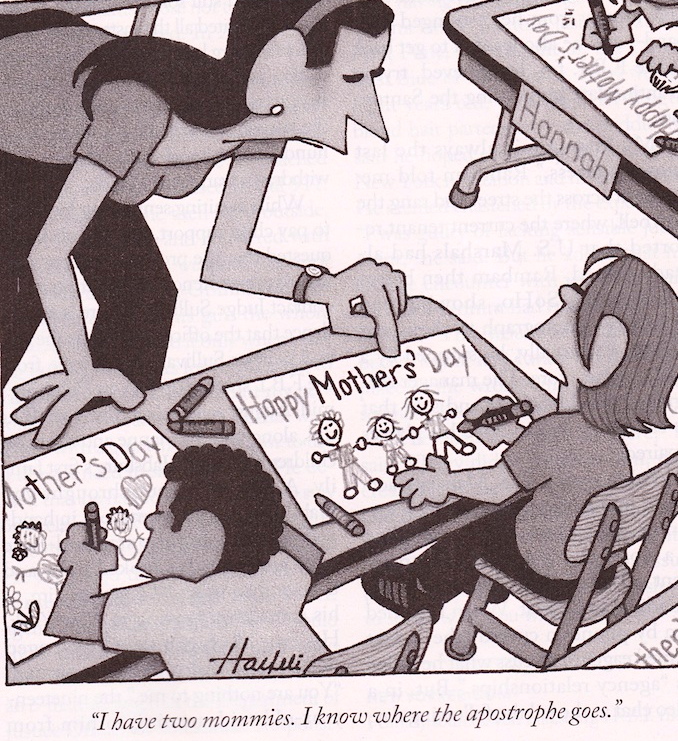Presidents, Mothers, Fathers. All arouse punctuational angst, and much variation. To take the next of these occasions to come upon us in the U.S.: is May 8, 2011, a day for mothers (Npl + N compound), a day that’s your mother’s (Nsgposs + N compound), or a day that’s our mothers’ (Nplposs + N compound)? This is a case where I tend to recommend jettisoning the apostrophe on the grounds of simplicity, since the meaning distinctions are so subtle, but I have to admit that my own usage varies.
Still, there are times when the placement of that apostrophe is significant, and William Haefeli has hit on one in the latest (May 2) issue of the New Yorker:
A while back, I assembled an inventory of postings on apostrophes on Language Log — the work of some hours, alas — but haven’t added things from this blog, or (omigod) annotated the inventory to make it really useful, so it’s not ready for unveiling to the world. But one thing I discovered in my searches through LLog was that the comments on all sorts of postings having to do with usage branched off into peeving, or even rage, about “apostrophe misuse” as an example of something the writer absolutely couldn’t abide. Apostrophes missing in various places where they are prescribed, apostrophes used in places where they are proscribed.
Now, it’s not hard to concoct examples where apostrophe misuse can lead to ambiguity, out of context, for an uncooperative reader, but in fact most of the examples people collect or construct are easily interpretable in context by a cooperative reader (one who’s willing to try to divine the writer’s intent); they violate the (sometimes complex and tricky) conventions of standard written English, but they don’t produce uninterpretable gibberish. Mis-steps, but small ones, and not something to get in a froth about.
Still, sometimes where you put that apostrophe makes a subtle but important distinction, as for Heather in Haefeli’s cartoon, with her two mommies.
[Notice that the teacher could still object that the name of the holiday (a proper noun) is Mother’s Day and that the holiday isn’t about Heather personally, so Heather has no right to adjust the form of the expression to suit her own condition — an argument for WF (well-formedness according to some convention) over Faith (faithfulness, in this case fitting the expression to the context); on Faith vs. WF, see here. (Let me remind you that neither Faith nor WF is “right”; they are two equally valid, but often conflicting, general principles, in constant tension, resolved in different ways in different contexts, by different people.)
I’m with Heather in this case. But she might have a hard time working against a teacher committed to WF on holiday names, especially a teacher who finds the whole two-mommies business distasteful.]

May 3, 2011 at 5:38 am |
In speech, of course, with any regular noun (like, say, mother or president) there’s no way of knowing if you have an apostrophe at all, let alone where it goes.
Someplace I read that you should substitute an irregular noun and see what sounds right – woman’s day, women’s day, women day? You could also substitute a “for X” clause – day for a woman, for women, that belongs to women…
Not that that defeats the “But the name is!!” group.
May 3, 2011 at 5:39 am |
Err, “day for a mother, for mothers, that belongs to mothers/a mother”
May 3, 2011 at 5:55 am |
But mothers is not a possessive, as I understand it. It is a noun modifier like Martin Luther King day, Columbus day, Armistice day. It is not like Lincoln’s birthday. It is a day about or for mothers, not a day owned by them (or by her).
May 3, 2011 at 6:19 am |
But compounds with first elements that are possessive in form are very common: women’s club, girls’ school, child’s play, and thousands more. And many of these express ‘for’ or ‘by’ or ‘about’ rather than possession.
Maybe you’re confusing the inflectional form often called the “possessive” (I usually prefer to label the form “poss” or “Poss”) and constructions expressing possession (in some broad sense). Poss is used in several constructions expressing possession, but it has huge numbers of other uses (and possession can be expressed by means other than Poss).